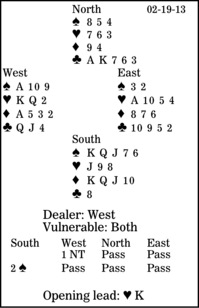Bridge column, February 19: From where is the sixth winner?

Whenever you are on defense and the dummy has come down, ask yourself from where you might get the winners that you need to defeat the contract.
In this deal, East-West need six tricks to beat two spades. When West leads the heart king and East signals enthusiastically with the 10, West can see five winners: one spade, three hearts and one club. But from where is the sixth winner coming?
South's two-spade overcall was part of the Cappelletti convention, showing spades and either minor.
West should realize that it is unlikely his side will get two diamond tricks. South must have something for his vulnerable overcall. And if that is the case, West probably needs to take two trump tricks, which will be possible if East began with exactly four hearts. (East won't have five, because he would have transferred out of one no-trump.)
After the king and queen of hearts, West can play a heart to East's ace. Then leading the last heart promotes a second trump trick for West. (If South ruffs low, West overruffs; if South ruffs high, West discards.) But will East know to play the last heart?
Probably not; he is highly likely to shift to a diamond. To save East from himself, West should cash the diamond ace before playing the third heart. This ace denies the king; with the ace and king of diamonds, West would cash the king first, not the ace.
** ** **
COPYRIGHT: 2013, UNITED FEATURE SYNDICATE
DISTRIBUTED BY UNIVERSAL UCLICK FOR UFS

